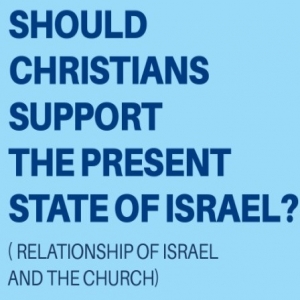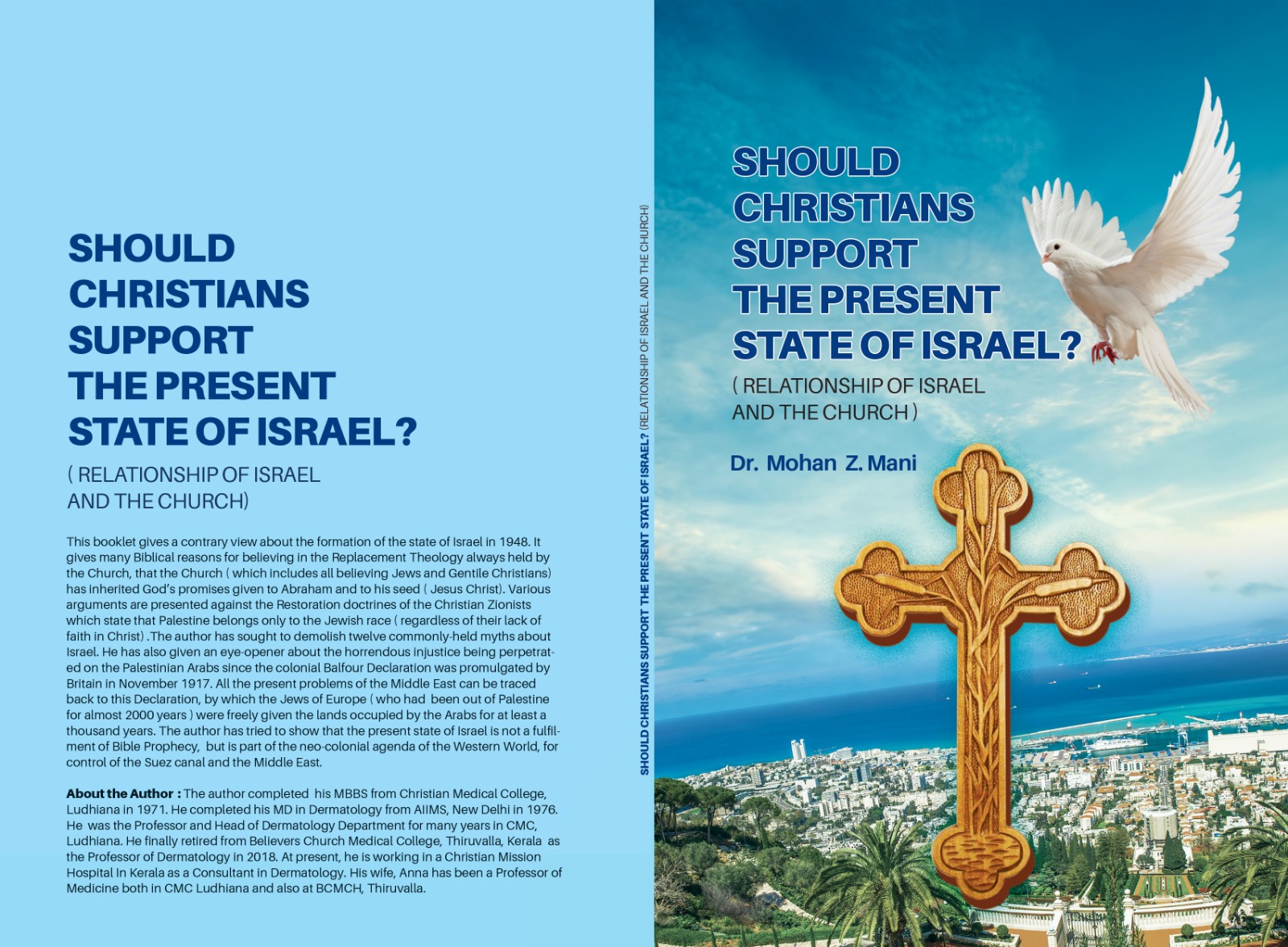
.png) Dr Shailendra Awale
Dr Shailendra Awale

Israel as a chosen people of God and as a nation-state is always discussed passionately, often compromising its objectivity. The ongoing military conflict (since October 2023) between Hamas, the elected government of Gaza, and Israel under Netanyahu's rule has posed serious ethical and theological problems. The Church and its members worldwide are divided on the issues, lacking comprehensive and objective analysis of its implications. In his book, "Should Christians Support the Present State of Israel?", renowned medical practitioner Prof Dr Mohan Z Mani (retired Dermatology professor) gives theological, historical, and political perspectives on the critical issue. His objective analysis makes the categorical assertion that we, the Church and believers, are given the same choice that Pontius Pilate gave the Jews, whether to prefer Jesus of Nazareth or Barabbas (militant murderer).
Dr Mani graduated from Christian Medical College, Ludhiana, and is known for his evangelical teachings. He has been active in biblical studies since his student days through his work in reputed Christian mission institutes. When there are clear divisions between ecumenical and evangelical churches, families often get diverse opinions, so there is a need for such a comprehensive analysis, an easy-to-read and brief booklet of merely 64 pages.
The book results from his deep concern and passion for the prevalent discussions to support the Israel State under Netanyahu. His concern and his training in the medical sciences led to a systematic study of biblical teaching, research in historical developments, and its socio-political implications. In his extended book-length essay titled "Should Christians support the present state of Israel?", he explores the relationship between the state of Israel and the Church. As of May 21, 2024, over 37000 people (35562 Palestinian and 1478 Israeli) were killed, including 105 journalists (100 Palestinian, 2 Israeli, 3 Lebanese) and 224 aid workers. Such atrocities are condemnable even with the Old Testament standards of "an eye for an eye".
Hamas is considered a militant revolutionary fighting for self-rule, much like other historical figures, while Israel continues her conquest and establishing settlements as a fulfilment of the divine promise. However, in the present political and social understanding, such military adventures are not advisable, but they are deplorable, too. The Zionist theology has controlled the narrative, forcing the Church to support present Zionist, unbelieving, and atheist Israel.
Dr Mani has presented historical information (geopolitical decisions as a part of the colonial agenda of Great Britain and France then) and biblical references (Zionism) that have led to the present situation as a problem profile. The actions of Netanyahu and his team are against all international laws: Israelis are the interlopers and usurpers of Palestine. He gives the history of occupation, regimes, and control of Judah, Galilee, and Samaria. The conflict between the Replacement Theology held by the Church for 2000 years and the Restoration Theology propagated for the last 200 years is presented well, bringing theological clarity.
The author has presented more than 20 quotations from the New Testament suggesting the Church has replaced Israel as God's people. There is no need to revert to the old covenant nor try to mix the new covenant with the old covenant as desired by Christian Zionism. After that, the author addresses the myths about Israel and specific arguments propagated by Christian Zionists and misguided bible teachers. These myths are readings from the Old Testament presented as arguments for restoration theology.
There is a separate section describing various strategic and geopolitical events aimed at imperial and colonial expansion and further leading to the Israel conflict; it covers British hegemony after a successful campaign in Waterloo in 1815, the advent of the Christian Zionist movement led by John Darby, Anglican Priest turned Plymouth Brethren and Cyrus Scofield, American Dispensationalist, Palestinian Arab support to British forces to evict Ottoman Turks, but the British failed to fulfil the treaty. It came up with the Balfour Declaration, a promise to Rothschild, a Jewish financier and interlocutor, which finally led to Two Nation Solutions, Nakba of 1948, to the present events; all these forces contributed to the Zionist agenda and annihilation of Palestinians from their homeland. This section is a testimony of the author's scholarship in geopolitical and strategic disciplines.
In the preface, the author has dedicated the booklet to the 32,000 innocent Palestinian civilians of Gaza and journalists and aid workers who met an early and unexpected death at the hands of the state of Israel under Netanyahu. In the closing chapter, the author has underlined peaceful coexistence by accepting two-nation solutions as a way forward. Yet the observations, analysis, and remarks are very comprehensive and objective.
Since his student days, Dr Mani has been involved in a Christian evangelical environment. Further, he admits that when Israel took over Jerusalem in June 1967, he considered it a fulfilment of prophecy. He adds that, at that time, he did not know any alternative explanations and felt that Israel was the key to prophecy, a softer Christian Zionism. So, his journey is remarkable and convincing. Learning the milestones or motives for that journey and the changes in perspectives would have been worthwhile.
This booklet is not against the majority of peaceful and tolerant world Jewry who practice Judaism. Still, it holds the atheistic and regenerative State of Israel under the present dispensation to account for its aggressive actions. The proper and final Restoration of the believing Jewish remnant could be fulfilled just before or during the Millennium. I strongly recommend the book for every church member and obedient follower of Christ as they have to choose between Jesus of Nazareth and Criminal Barabbas.